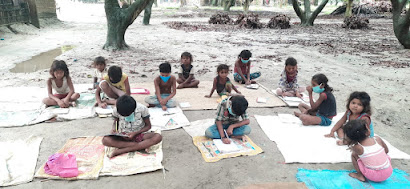Sangeeta, a young girl from Daniyalpur village in Munger district of Bihar, is making phone calls for 2 hours every single day, to tell stories to her children, and share learning activities with mothers. These activities are designed using daily objects and can easily be understood by women, irrespective of their literacy level.
For example,. exploring leaves to learn about different shapes, counting utensils to learn numbers, and so on.
Sangeeta’s efforts ensure that the children in her community continue their learning during the pandemic. Even though these children have limited access to digital technology. Following the structured session plans with learning activities appropriate to the level of each child gives heran edge against digital solutions, which rely just on dissemination of content.
“Education is not only about sharing of information, but also as much about dialogue, debate, and critical analysis of information”, says Sangeeta. The in-person facilitation ensures that her children learn to do that instead of just consuming the animated content on the digital device.
The disruptions caused by COVID-19 must serve as an inflexion point to recognise the critical role that community initiatives can play in education, especially in rural India. The challenge to provide education in the deep interior pockets of the country during Covid is a case in point.
“Whom can we rely upon? Who can take the baton of educating our children?”, ask Ravi Dhanuka, Co-founder and CEO of I-Saksham Education And Learning Foundation (i-Saksham), a not-for profit organization working in extremism affected districts of Bihar to transform local youth - mainly females - into community edu-leaders.
There are 100 edu-leaders like Sangeeta who are trained by i-Saksham go through a 2-year fellowship program. They help in imparting better quality education in remote areas, in partnership with government schools. During normal days, these edu-leaders go to under-resourced primary schools, and assist government school teachers to effectively teach multi-grade classroom through modern-day pedagogy methods.
They meet school management committees every month, organize learning fairs in villages, and meet parents on an individual basis, to showcase how children have begun to show significant improvement in their learning level.
The forced school closures due to pandemic have affected over 30 crore children, resulting in poor children falling further behind and at risk of dropping out of the system.
In a separate initiative, i-Saksham has formed a collective with 7 educational organizations such as JEEViKA (a World Bank aided Livelihood Project that forms women self-help groups) and Mahila Samakhya (a MHRD run program to create women leaders who work on literacy and gender). The idea is to undertake community-led initiatives related to education in remote villages of the country during Covid-19.
The project is running as ‘Shiksha Sahelis’ in Bihar, where young mothers, supported by these institutions are coming forward to run community learning centres as long as schools are closed, and undertake project based learning activities.
“Our core belief has been that the community must demand quality education for any large scale change in the system to sustain”, shares Ravi. This core belief led to the birth of i-Saksham to work with youth, the most active agents of the society and create them into change-makers, the edu-leaders.
Kiran, a young mother, and another edu-leader from Mahgama Panchayat, affected with extremist violence, assists single teacher led schools with 5 grades in 1 classroom.
“The way she manages her classroom by dividing children into various learning groups, and assigning them activities appropriate to their learning level would make any teacher hold his breath in awe”, shares the headmaster of the school. “She decorates her classroom so well each day based on the theme she is teaching, and uses many child-centric activity-based learning methods… which are generally seen only in training sessions!”
“My biggest achievement has been that my community members, parents of these kids, have become hopeful of change”, say Sangeeta and Kiran. “They now believe that their children can learn. They have access to the same educational methods that rich kids would pay every month the sum equivalent to our annual income”.
The impact of i-Saksham not only transforms the educational journey of children, but also the lives of youth ie the edu-leaders. Today, 10 of i-Saksham first batch of edu-leaders are pursuing professional courses in education from prestigious universities of the country like Tata Institute of Social Sciences, Mumbai; and Azim Premji University, Bangalore.
Ravi (director, i-Saksham) shares that the fight against inequity in education is huge and cannot be won unless more and more spaces and capabilities are created to support the mainstream public education system. Solely blaming the system won’t help. We must first become the capable community to support the system and then must also learn to hold it accountable.
Unless we learn to do it, we can’t expect democratic institutions like schools to perform well. They too respond to the need of their clients, based on how vociferous their customers are. It is high time to revitalize the third pillar-the community, one of the critical building blocks of a good society (as Raghuram Rajan argues in his book-The Third Pillar).


No comments:
Post a Comment